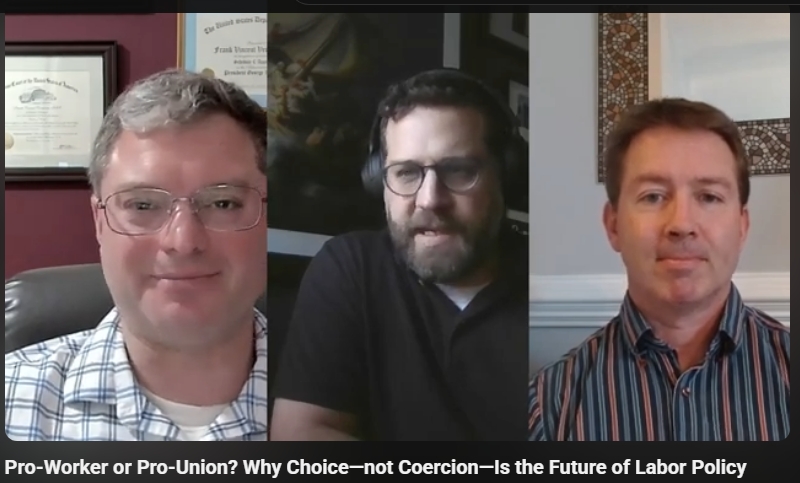Posts tagged Commonwealth Foundation
Op-Ed Aaron Withe: Public-Sector Unions Have a Transparency Problem
December 18, 2025 // California takes it a step further. State law actually prohibits public employers from informing workers of their constitutional right to opt out. The Freedom Foundation is challenging these “gag rules” in court on behalf of Shasta County. The government actively prevents workers from learning the truth because it serves union financial interests. If unions provided valuable services that members wanted, they wouldn’t need to ensnare people through intimidation and bureaucratic obstacles.

Pro-Worker or Pro-Union? Why Choice—not Coercion—Is the Future of Labor Policy, Disunion: The Government Union Report; Commonwealth Foundation
December 18, 2025 // This week on Disunion, host David Osborne is joined by Austen Bannan of Americans for Prosperity and Vincent Vernuccio, president of the Institute for the American Worker, to break down a sweeping new report: How to Empower Workers: Embracing a Pro-Worker Agenda Built on Choice. With Congress rolling out a flurry of labor bills—from right-to-work reforms and secret ballot protections to proposals backed by unions and even some Republicans—this episode cuts through the noise. The panel explains why many so-called “pro-worker” policies actually empower union bosses and government regulators, not workers themselves.

Report: Government unions spent $915 million on politics in 2024
December 17, 2025 // The Commonwealth Foundation’s most recent report found the top four public sector unions: the National Education Association, American Federation of Teachers, Service Employees International Union and the American Federation of State, County and Municipal Employees spent over $915 million on politics during the 2023-2024 cycle. The unions spent $755 million on federal elections and policies while their state affiliates spent $160 million on state races and policies.
Unions spend big on politics — often at the expense of their members
December 2, 2025 // “When I signed my union membership card, I did not check the back saying I wanted to contribute to the union political action committee,” writes Marie Dupont, a teacher and NJEA member, in The Wall Street Journal. “That was a contract stating my dues wouldn’t go to the union political apparatus, but a handful of insiders ignored that choice and broke that trust.” NJEA funneled general funds through Garden State Forward, Working New Jersey, and Protecting Our Democracy — all election-focused organizations that not only backed Spiller but also were headed by the NJEA president. These questionable activities landed NJEA in court with a lawsuit alleging that the union misled its members, including Dupont, who is a lead plaintiff.
Americans for Prosperity Leads Employee Rights Act Coalition
September 8, 2025 // Protect workers’ right to a secret ballot in union elections. Preserve flexible self-employment career-paths across American industries. Protect small businesses that operate as franchises and vendors for other businesses. Give workers control over their personal information during union campaigns. Allow workers in Right-to-Work states to opt out of union representation. Require opt-in consent for union political spending. Prohibit mandatory DEI mandates in union contracts. Ensure only citizens or authorized workers vote in union elections.
Op-Ed Andrew Holman: Union political spending doesn’t represent all their members
October 30, 2024 // Most of Pennsylvania’s public sector unions’ certifications date back to the 1970s, meaning many of their employees have never had the opportunity to vote on their representation. Without accountability, public sector unions are free to divert resources from representation toward partisan politics with no regard for members. The rank-and-file deserves better from their unions.

Government Unions are Down — But Not Out
September 10, 2024 // For nearly a decade, the Commonwealth Foundation has tracked state-by-state changes in labor laws. Every two years, the Commonwealth Foundation releases its research on the ever-changing legal landscape for public sector unions, assessing each state’s efforts to promote public employees’ rights or cave to unions’ entrenched influence. This fourth edition examines government unions’ attempts, following Janus, to hold onto and expand special legal privileges under state laws. The research also highlights the states reining in government unions’ power and influence by empowering workers.
Unions pursue law changes to boost membership
September 8, 2024 // “The overarching theme is that the unions have really responded to the membership losses since JANUS to drive up union membership,” Osborne said. In the JANUS decision, courts held that unions could no longer collect “fair share” dues from non-members who benefit from collective bargaining agreements. Follow-up litigation has challenged the cumbersome process many former members had to overcome to leave the union and recoup dues improperly withheld. In the report, states known as union “strongholds” scored lower than others that have enacted collective bargaining reforms.
Op-Ed: Florida vs. Michigan on Public Unions
August 30, 2024 // Each local union chapter must show that at least 60% of its eligible members are paying dues, or the state requires it to hold a new election. That sets teachers, clerks and custodians free from unions that haven’t won them over, and at least 20 units have been decertified in the past year. A few other states have also rolled back union coercion. Arkansas and Tennessee enacted paycheck protection for teachers. Kentucky legislators overrode a veto by Democratic Gov. Andy Beshear to secure the same. On the other side of the trend is Michigan, where Gov. Gretchen Whitmer signed a repeal of paycheck protection for teachers last summer. She also ended a requirement that schools pay teachers based on merit instead of seniority alone

Public employee unions took over Michigan. Now they’re eyeing Pennsylvania
May 7, 2024 // Bad as this is for taxpayers, the union-backed legislators have made things even worse for workers. A new law requires government employers to provide unions with employees’ personal contact information within 30 days of hiring. Employers must update and resubmit this information every 90 days. Unions are thus given free rein to inundate workers with political or other material whether it is wanted or not.
